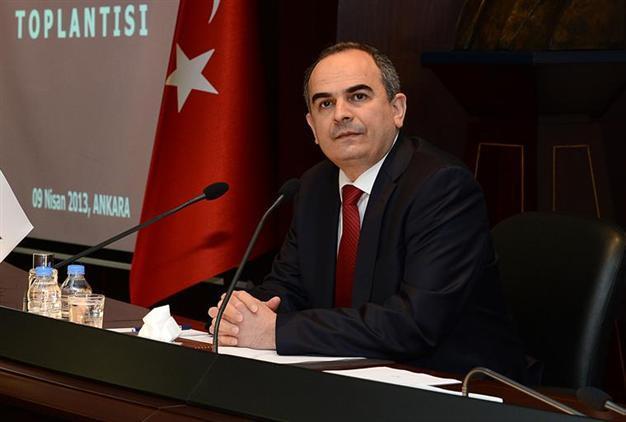Turkish Central Bank cuts interest rates to stimulate growth
ISTANBUL – Reuters

Turkish Central Bank Governor Erdem Başçı. AA photo
Turkey’s central bank cut its three main interest rates by 50 basis points each today in a bid to stimulate growth and guard against an appreciating lira, sending benchmark bond yields to a record low.Turkish economic growth slowed sharply to 2.2 percent last year and the central bank has been trying to spur the economy since mid-2012, embarking on a series of rate cuts last September. Domestic demand remains weak, although bank lending is rising faster than the central bank wants.
The bank cut its one-week repo policy rate to 5.0 percent, its overnight borrowing rate to 4.0 percent and its overnight lending rate to 7.0 percent.
“In order to balance risks to financial stability, the committee deemed it appropriate to maintain macro-prudential measures ... by keeping interest rates low while increasing forex reserves,” the bank said in a statement.
The bank raised the amount of forex that lenders have to provide to hold a portion of their required reserves in foreign exchange, a move which will boost its own forex reserves while tightening lenders’ forex liquidity.
“It’s a late but right decision,” said Turkish Economy Minister Zafer Çağlayan, who has been criticizing the central bank policies for slowing down Turkiisg economy’s growth by “stepping on the brake,” rather than gas.
Turkish Prime Minister Recep Tayyip Erdoğan had said April 5 he finds the interest rate of Turkey too high.
Central Bank Governor Erdem Başçı had hinted earlier at a rate cut, saying this month that the bank may consider lowering its main rate if the lira climbed too fast, which could widen Turkey’s current account deficit, its main economic weakness.
A stronger lira makes exports more expensive and imports cheaper, which can widen the current account gap and put Turkey deeper into debt to external markets. The gap is expected to grow to over $58 billion this year from $47 billion in 2012.
“It was quite a bold move. They want to clearly make a point on their commitment to maintain the currency stable and to prevent appreciation,” said Gaelle Blanchard, emerging markets strategist at Societe Generale.
The bank last cut its policy rate in December, when it trimmed the rate by 25 basis points. Before that, the previous cut was in August 2011, again a 25 basis point reduction.
Last month, the bank unexpectedly slashed its overnight lending rate but moved to tighten liquidity overall by reducing lira funding and draining more foreign currency and gold from the market.
















